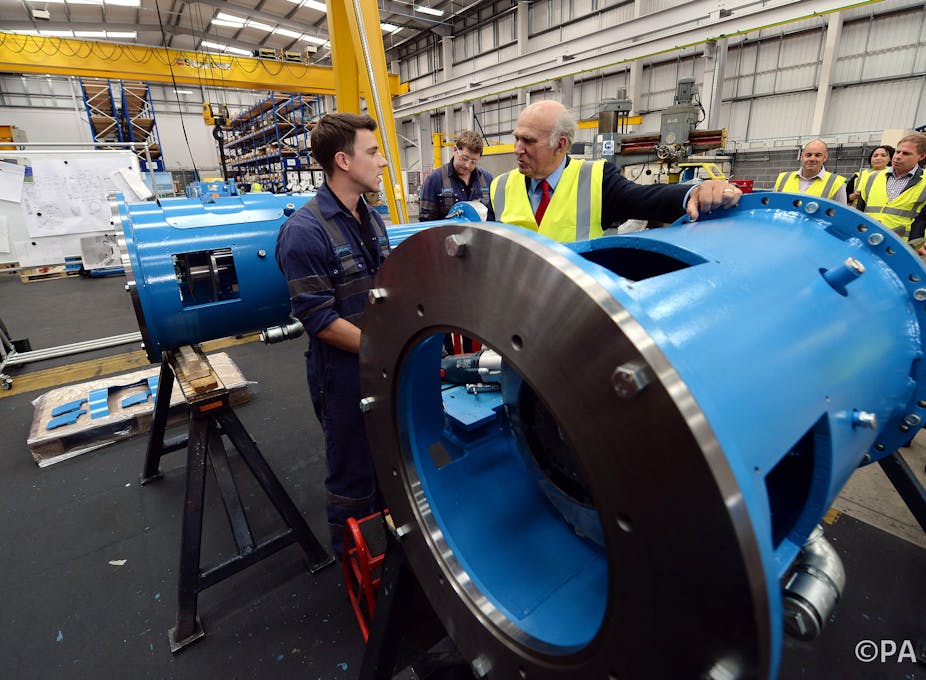We are celebrating the 2.1m apprenticeship starts since 2010 and the positive impact they are having on businesses around the country.
Vince Cable, Liberal Democrat business secretary, during National Apprenticeship Week.
We challenge the claim made by Vince Cable because it presents a misleading picture of what apprenticeship means today. For the past decade, ministers have proclaimed year-on-year rises in apprentice numbers, usually pictured standing alongside school leavers in bright shiny engineering companies.
Apprenticeship stirs the hearts of politicians, the general public and the media. It evokes a golden age of strong manufacturing and employers willing to invest in a skilled workforce. The last Labour government and the coalition have positioned apprenticeship as a key policy to solve skills shortages and offer young people an attractive alternative to university.
Apprenticeship is funded in three age bands: under 19 (16-18 year olds); 19 to 24; and 25 and over. There is no upper age limit so we have around 3,000 apprentices aged 60 and over.

Adding up the total from the table above, gives Cable his grand total of 2,075,930 apprenticeships. But, the figures also reveal that 40% were aged 25 or over, 34% aged 19-24 and only 26% aged 16-18 when they started their apprenticeship. Why does this matter?
The so-called growth in apprenticeship has been achieved by blurring the important distinction between apprenticeship and the standard on-the-job training that anyone in employment might be expected to do. Many apprentices aged 19 and over, and particularly those aged 25 and over, were already in a job when they were “converted” into becoming apprentices.
Their apprenticeship will have involved having their existing skills accredited plus tuition to pass the “Functional Skills” tests in maths, English and information and communications technology. Some will have developed new skills, but government doesn’t check this.
Survey data suggests that the “conversion rate” in some sectors such as health and social care, where older apprentices dominate, is as high as 90%.
The figures don’t refer to individuals but to registrations in apprenticeship frameworks. The government calls these registrations “starts”. If an individual registers for two apprenticeships within the same year, this appears as two “starts” in the figures. While it would be unusual for someone to do this, we don’t have any way of checking how often this happens.
Dig into the figures and we find that just about half (48%) of all new apprenticeships are in five sectors: health and social care; business administration; management; customer service; and hospitality and catering. There are fewer apprenticeships in manufacturing and craft sectors, engineering is in eighth place, construction in ninth and hairdressing in eleventh.
Cable can claim that the coalition’s reforms have begun to tackle quality concerns and reverse the dominance of “adult apprenticeship” and “conversions”, but there is a long way to go. Until August 2012, many apprentices were on programmes lasting less than one year, and most apprentices (65%) were still starting on the lowest level of programme – Level 2 which is classed as equivalent to GCSE A* to C grades. Level 2 apprenticeships are important, but we need to see more growth at Level 3 to boost the country’s stock of technical skills and create a strong ladder of progression through the work-based route for young people.
Following a lot of public and media concern about very short duration apprenticeships, some lasting only a few weeks, the government introduced a new minimum length of 12 months. The minimum length requirement however doesn’t address the problem of ensuring that apprenticeship is significantly different to normal on-the-job or induction training.
Creating a robust apprenticeship system won’t be easy as the economy struggles to rebalance and not enough employers want to invest in long-term skill development. We do have some excellent apprenticeships, but we lack the political and industrial will and institutional arrangements to sustain real apprenticeships on the scale the country needs.
Verdict
Cable’s figure of 2.1m apprenticeship “starts” (registrations) is factually correct, but as we’ve argued, the figures are misleading. It isn’t possible to say with certainty that 2.1m registrations equals 2.1m people. The bigger underlying problem is what counts as an apprenticeship. We need to know much more about what converted apprentices and particularly those who’ve been in a job for many years are actually learning.
Review
The criticisms made in this fact check are largely correct. There is no doubt that if so many apprenticeships had been created it would constitute a minor miracle because it would mean a fundamental change in employer behaviour and indeed a fundamental change in the number of jobs that really require skilled workers. Yet we know that the jobs that have been created during the coalition government’s time in office have largely been low-wage and relatively low-skilled jobs, although the two should not be automatically equated.
As the fact check notes, the notion of an apprenticeship has been changed. We are no longer referring to apprenticeships of the kind we might find at Rolls Royce. Many service-level jobs are routinised and if they require lengthy apprenticeships it is because employers have moved to a German system of values in relationship to training and work, where shop assistants can expect three years or more of training. It is for this reason that I refer to what would be a minor miracle: it would mean that the business model in the UK has changed in ways that are highly unlikely.
Click here to request a check. Please include the statement you would like us to check, the date it was made, and a link if possible. You can also email factcheck@theconversation.com

